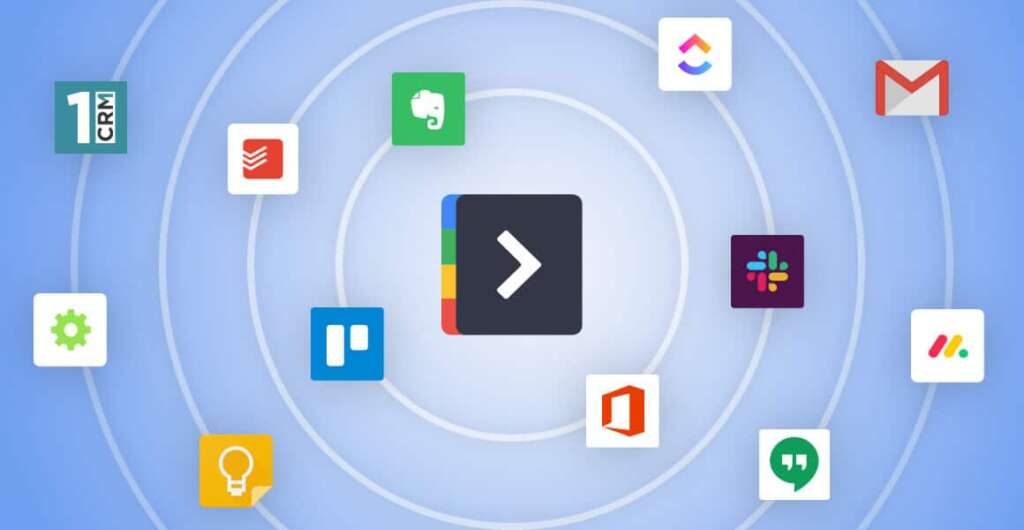Table of Contents
In today’s fast-paced and interconnected business landscape, the right software tools can be the key to unlocking productivity, efficiency, and growth. From project management and communication to marketing, sales, and customer support, these tools have become indispensable for businesses of all sizes and industries.
In the digital age, where the competition is fierce and customer expectations are higher than ever, the need for streamlined operations, seamless collaboration, and data-driven decision-making has never been more critical. Fortunately, a plethora of business software tools has emerged to address these challenges and empower organizations to thrive in the modern marketplace.
In this comprehensive guide, we’ll explore the top business software tools that are reshaping the way companies operate and succeed. Each of these tools has its unique strengths, designed to meet specific business needs and objectives. Whether you’re a startup looking to streamline your processes, a growing company aiming to scale, or an enterprise seeking to stay ahead of the curve, you’ll find a tool that aligns with your goals.
Join us on this journey as we delve into the features, benefits, and real-world applications of these software solutions. From enhancing project management and revolutionizing communication to optimizing marketing strategies and providing exceptional customer support, these tools are your gateway to achieving excellence in your business operations.
In a world where innovation and efficiency are the cornerstones of success, choosing the right business software tools is not just an option; it’s a strategic imperative. So, let’s embark on this exploration of the top business software tools that have the potential to transform your organization and propel it toward a future of productivity and growth.
1. Business Software Tools: Slack: Enhanced Business Communication
Efficient communication is the lifeblood of any successful organization, and Slack excels in this arena. It serves as the central hub for business communication, offering a versatile platform for teams to collaborate, share information, and stay connected.
Slack’s chat functionality goes beyond simple text-based conversations. It allows for the creation of themed channels, enabling specialized discussions for departments, projects, or even company-wide announcements. These channels keep communication organized, ensuring that every team member is in the loop.
What truly sets Slack apart is its ecosystem of integrations and bots. This expansive marketplace ensures that Slack can seamlessly integrate with other software and services your business relies on. Whether you need to sync with project management tools, access files from cloud storage services, or receive real-time updates from third-party apps, Slack’s versatility enhances productivity.
The platform’s video conferencing and voice call features further elevate its capabilities. It’s not just a messaging tool; it’s a comprehensive communication solution designed to streamline collaboration and improve efficiency. Slack is the modern workspace where teams come together to share ideas, make decisions, and drive results.
2.Business Software Tools: Google Workspace: Collaborative Cloud Productivity
As the digital landscape continues to evolve, Google Workspace has emerged as a powerhouse for cloud-based productivity and collaboration. Formerly known as G Suite, this suite of cloud computing, productivity, and collaboration tools transforms the way businesses operate in the digital realm.
At its core, Google Workspace offers a suite of familiar applications, including Gmail, Google Drive, Google Docs, Google Sheets, and Google Slides. These cloud-based tools enable real-time collaboration, allowing teams to work on documents, spreadsheets, and presentations simultaneously from anywhere in the world.
One of the standout features of Google Workspace is its ability to seamlessly integrate with other Google services. This includes Google Meet for video conferencing and Google Calendar for scheduling and planning. The ecosystem fosters efficient communication and collaboration, making it an ideal choice for remote teams and distributed workforces.
Security is paramount, and Google Workspace provides advanced security features to protect your data and communications. With built-in compliance and eDiscovery tools, it ensures that your organization can meet its regulatory requirements.
For businesses looking to embrace the cloud and enhance productivity through seamless collaboration, Google Workspace is a comprehensive solution that empowers teams to work smarter and achieve more.
3. Business Software Tools: Microsoft Teams: Integrated Collaboration Powerhouse
In the dynamic realm of business software, Microsoft Teams emerges as an integrated collaboration powerhouse. Offering a suite of features that redefine teamwork, this platform seamlessly combines chat, video conferencing, storage, and apps, creating a unified digital workspace for organizations.
Microsoft Teams empowers businesses to establish dedicated channels for various projects or departments, ensuring organized and accessible communication. Real-time document collaboration within Microsoft 365 apps simplifies cooperative work on documents and presentations. The platform also supports video meetings and webinars, making it ideal for remote work and client presentations.
What sets Microsoft Teams apart is its adaptability across industries. Whether you’re in healthcare, education, or corporate settings, Teams provides tailored solutions, including industry-specific compliance and security features. Its extensive library of third-party app integrations ensures Teams can be customized to meet your unique business needs.
4. Asana: Streamlining Task and Project Management
Asana, a versatile work management platform, is synonymous with precision and finesse in managing tasks and projects. It empowers businesses to organize tasks, set priorities, and effortlessly track work progress. Whether you’re handling a small team or complex projects with numerous stakeholders, Asana’s intuitive interface and robust feature set cater to a wide range of needs.
Asana provides a bird’s-eye view of project timelines through Gantt charts, Kanban boards, and task lists. Teams can assign tasks, set due dates, and establish dependencies to ensure projects stay on track. The calendar view offers a comprehensive overview of project schedules, simplifying resource allocation.
This platform also fosters team collaboration by enabling discussions within tasks, reducing the need for lengthy email threads. Integrations with email clients like Gmail and Outlook centralize important communication within the platform.
For businesses aiming to boost productivity by simplifying complex projects and fostering teamwork, Asana remains a top-tier choice.
5. Business Software Tools: Zoom: Revolutionizing Virtual Meetings and Collaboration
In the era of remote work and global connectivity, Zoom has become synonymous with virtual meetings and collaboration. Its video conferencing platform has soared in popularity, serving as the virtual boardroom for businesses worldwide. Zoom offers a range of features that not only make meetings seamless but also enhance collaboration across teams and organizations.
One of Zoom’s standout features is its high-definition video and audio quality, ensuring that every participant feels present and engaged, even when miles apart. Screen sharing and annotation tools simplify presentations, while breakout rooms facilitate small group discussions within larger meetings. These capabilities are invaluable for team huddles, client presentations, and webinars.
Zoom’s integration with scheduling tools like Google Calendar and Microsoft Outlook ensures that meetings are well-organized and reminders are sent automatically. Furthermore, Zoom’s recording feature enables teams to archive meetings for future reference or sharing with absent colleagues.
As businesses continue to embrace flexible work arrangements, Zoom remains a cornerstone of virtual collaboration, providing a platform where ideas flow, decisions are made, and connections thrive.
6. QuickBooks: Simplifying Financial Management for Businesses
Financial management is the backbone of any successful business, and QuickBooks has emerged as a trusted ally in this domain. It’s not just accounting software; it’s a comprehensive financial management solution that empowers businesses to track income, expenses, and profits with ease.
One of QuickBooks’ strengths lies in its user-friendly interface, making it accessible to business owners, accountants, and finance professionals alike. Invoicing becomes a breeze with customizable templates, while expense tracking ensures that no financial detail is overlooked. The software also simplifies payroll management, streamlining one of the most critical aspects of running a business.
QuickBooks’ financial reporting tools provide insights into business performance, allowing for informed decision-making. It also integrates seamlessly with various banks and financial institutions, ensuring that transactions are synchronized and up-to-date.
For businesses of all sizes, QuickBooks is more than just an accounting tool; it’s a financial companion that simplifies complex financial tasks, promotes transparency, and empowers informed financial decisions.
7. Zendesk: Elevating Customer Support and Engagement
In today’s competitive business landscape, exceptional customer support is a differentiator, and Zendesk stands as a champion in this domain. It offers a comprehensive customer service and engagement platform that empowers businesses to deliver outstanding support experiences.
Zendesk’s ticketing system streamlines customer queries, ensuring that they are efficiently routed to the right agents for quick resolution. Beyond traditional support channels, Zendesk offers live chat, email, phone, and social media support, allowing businesses to engage with customers on their preferred platforms.
What sets Zendesk apart is its focus on data-driven insights. The platform provides analytics and reporting tools that help businesses understand customer behavior, identify trends, and optimize support processes. With AI-powered chatbots and automation, Zendesk can resolve routine queries instantly, freeing up agents to tackle more complex issues.
Zendesk’s flexibility makes it suitable for businesses of all sizes and industries. Whether you’re a startup aiming to build strong customer relationships or an established enterprise seeking to scale your support operations, Zendesk has the tools and scalability to meet your needs.
8. Business Software Tools: Salesforce: Unleashing the Power of Customer Relationship Management (CRM)
In the age of customer-centric business strategies, Salesforce reigns as the leader in Customer Relationship Management (CRM) solutions. It provides businesses with a robust platform to manage and nurture customer relationships, drive sales, and boost overall productivity.
Salesforce offers a suite of interconnected tools that encompass sales automation, marketing automation, analytics, and customer service. It allows businesses to track leads, manage opportunities, automate marketing campaigns, and provide exceptional customer support—all within a single platform.
What sets Salesforce apart is its scalability and customization capabilities. It caters to businesses of all sizes, from small startups to global enterprises. With a vast library of third-party app integrations and a marketplace of ready-to-use solutions, Salesforce can adapt to your unique business needs and industry requirements.
The platform’s analytics and reporting tools provide actionable insights, enabling data-driven decision-making. Salesforce empowers businesses to build stronger customer relationships, drive growth, and stay ahead of the competition in a rapidly evolving marketplace.
For businesses committed to delivering exceptional customer experiences and optimizing their sales processes, Salesforce remains the gold standard in CRM solutions.
9. Business Software Tools: HubSpot: Fueling Inbound Marketing and Sales
In the realm of inbound marketing and sales, HubSpot has established itself as a game-changer. It offers a comprehensive platform that empowers businesses to attract, engage, and delight customers. HubSpot’s tools cover marketing automation, sales CRM, customer service, and content management.
HubSpot’s inbound marketing features enable businesses to create, optimize, and analyze content that resonates with their target audience. It provides tools for email marketing, social media management, and search engine optimization (SEO), helping businesses generate leads and convert them into loyal customers.
The platform’s sales CRM streamlines the sales process, from lead tracking to deal management. It offers insights into prospect behavior, helping sales teams personalize their approach and close deals more effectively.
HubSpot’s customer service tools ensure that businesses can provide top-notch support, fostering customer satisfaction and loyalty. With a focus on the inbound methodology, HubSpot helps businesses attract customers naturally, creating a sustainable growth strategy.
10. Monday.com: Empowering Work Management
Monday.com is a versatile work operating system that empowers teams to run projects and workflows with confidence. It provides a centralized platform for work management, from project planning and task tracking to team collaboration and reporting.
One of Monday.com’s strengths is its flexibility. It offers customizable templates for various use cases, making it suitable for project managers, marketing teams, HR departments, and more. Teams can create workflows that align with their unique processes, ensuring that work is efficient and transparent.
The platform’s intuitive interface simplifies task assignment and progress tracking. It also offers automation features to reduce manual work and increase productivity. Visual timelines and calendars provide clear insights into project schedules and deadlines.
Monday.com fosters collaboration with features like file sharing, comments, and @mentions. Teams can work together seamlessly, even if they are distributed across different locations. The platform’s reporting and analytics tools enable data-driven decision-making, ensuring that projects stay on track and goals are achieved.
For businesses looking to streamline work processes, improve collaboration, and boost productivity, Monday.com is a versatile solution that adapts to your team’s unique needs.
Conclusion: The Path to Productivity and Growth
The world of business software tools is vast and ever-evolving, offering a multitude of solutions to boost productivity and drive growth. Whether you seek efficient project management, seamless communication, exceptional customer support, or comprehensive data insights, there’s a tool tailored to your needs.
By harnessing the power of these business software tools, organizations can streamline their operations, enhance collaboration, and provide outstanding customer experiences. As businesses continue to adapt to changing landscapes and digital transformations, investing in the right software tools remains a crucial step toward success.
Choose wisely, implement effectively, and watch as your business thrives in the modern, technology-driven era. Embrace these tools as catalysts for innovation, efficiency, and growth in an increasingly competitive business landscape. Your journey to enhanced productivity begins now.
Thank you for exploring the top business software tools with us. May your choice of tools pave the way for prosperity and success in your business endeavors.













